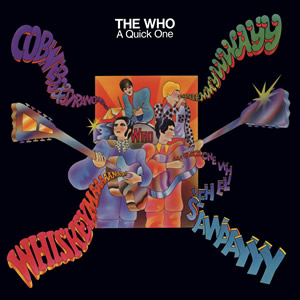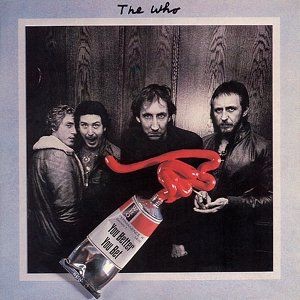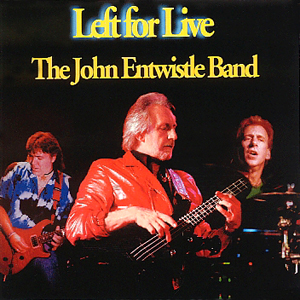
The Who are an English rock band formed in London in 1964. Their classic lineup (1964–1978) consisted of lead vocalist Roger Daltrey, guitarist Pete Townshend, bassist John Entwistle and drummer Keith Moon. They are considered one of the most influential rock bands of the 20th century. Their contributions to rock music include the development of the Marshall stack, large public address systems, the use of synthesisers, Entwistle's and Moon's influential playing styles, Townshend's feedback and power chord guitar technique, and the development of the rock opera. They are cited as an influence by many hard rock, punk, power pop and mod bands. The Who were inducted into the Rock and Roll Hall of Fame in 1990.

A Quick One is the second studio album by the English rock band the Who, released on 9 December 1966. A version of the album with an altered track listing was released under the name Happy Jack on Decca Records in April 1967 in the United States, where the song "Happy Jack" was a top 40 hit.

My Generation is the debut studio album by English rock band the Who, released on 3 December 1965 by Brunswick Records in the United Kingdom, and Festival Records in Australia. In the United States, it was released on 25 April 1966 by Decca Records as The Who Sings My Generation, with a different cover and a slightly altered track listing. Besides the members of the Who, being Roger Daltrey (vocals), Pete Townshend (guitar), John Entwistle (bass) and Keith Moon (drums), the album features contributions by session musician Nicky Hopkins (piano).

Who Are You is the eighth studio album by the English rock band the Who, released on 21 August 1978 by Polydor Records in the United Kingdom and MCA Records in the United States. Although the album received mixed reviews from critics, it was a commercial success, peaking at number 2 on the US charts and number 6 on the UK charts.

Odds & Sods is an album of studio outtakes by British rock band the Who. It was released by Track Records in the UK and Track/MCA in the US in October 1974. Ten of the recordings on the original eleven-song album were previously unreleased. The album reached No. 10 on the UK charts and No. 15 in the US.

The Ultimate Collection is a 2002 two-disc greatest hits set by the Who with both singles and top hits from albums, all of which have been remastered. The compilation was released by Polydor Records internationally and on MCA Records in the U.S. The first 150,000 copies added a third disk with rare tracks and music videos. The album debuted on the Billboard 200 album chart on 29 June 2002, at No. 31 and hit No. 17 on the British charts. It was certified gold by the RIAA on 15 July 2002 and platinum on 13 March 2008.

Then and Now is a 2004 greatest hits compilation album by The Who released internationally by Polydor Records and by Geffen Records in the United States. It features 18 Who classics and two new tracks—"Real Good Looking Boy" and "Old Red Wine"—which were the first Who originals since "Dig" from Pete Townshend's 1989 album The Iron Man. "Real Good Looking Boy" is a tribute to Elvis Presley, and "Old Red Wine" is a tribute to former band member John Entwistle, who died in 2002. The album was re-released in 2007 and replaced "Old Red Wine" with "It's Not Enough" from the 2006 album Endless Wire and "Summertime Blues" was replaced by "Baba O'Riley".

"5:15" is a song written by Pete Townshend of British rock band The Who. Part of the band's second rock opera, Quadrophenia (1973), the song was also released as a single and reached No. 20 on the UK Singles Chart, while the 1979 re-release reached No. 45 on the Billboard Hot 100.

"You Better You Bet" is a song by British rock band the Who, appearing as the first track on their 1981 album Face Dances. It is sung by frontman Roger Daltrey with backing vocals from Pete Townshend and bassist John Entwistle.

My Generation: The Very Best of The Who is one of The Who's many greatest hits collections, released by Polydor Records internationally and MCA Records in the United States in 1996. Its release coincided with the release of the remastered original albums and thus contained the newly remastered versions of the songs, and some also remixed.

"Squeeze Box" is a song by the Who from their album The Who by Numbers. Written by Pete Townshend, the lyrics are couched in sexual double entendres. Unlike many of the band's other hits, the song features country-like elements, as heard in Townshend's banjo picking.

Blues to the Bush is a live album by The Who recorded at the House of Blues in Chicago on 12 and 13 November 1999, and at the Empire Theatre, Shepherd's Bush on 22 and 23 December 1999. It was sold exclusively from the now defunct MusicMaker.com, though it can still be found on torrent sites and second hand markets such as EBay.

Under a Raging Moon is the sixth solo studio album by English singer Roger Daltrey, released in September 1985 by Atlantic Records. The album reached No. 42 on the US charts, and the single "After the Fire", written by Pete Townshend, reached No. 48. It includes a tribute to Keith Moon, former drummer of the Who who died in 1978, on the track "Under a Raging Moon". In Canada, the album reached No. 33 on the RPM Magazine charts, and "After the Fire" reached No. 53.

Who's Better, Who's Best: This Is the Very Best of the Who is a 1988 compilation album by the Who. A compilation of videos also titled Who's Better, Who's Best was released in 1988 as well.

"Dogs" is a UK single written by Pete Townshend and released by the Who in June 1968. It reached number 25 on the UK singles chart, lower than any single the band had released in several years. The B-side of the UK single was "Call Me Lightning". Both songs were originally released mixed in mono only, as they were not intended for album release.
"Had Enough" is a song written by the Who bassist John Entwistle, and featured on their eighth studio album, Who Are You (1978). It was also released as a double A-sided single with "Who Are You", making it Entwistle's second single A-side, after "Postcard" from Odds & Sods in 1974.

Quadrophenia is the soundtrack album to the 1979 film Quadrophenia which refers to the 1973 rock opera Quadrophenia. It was initially released on Polydor Records in 1979 as a cassette and LP and was re-released as a compact disc in 1993 and 2001. The album was dedicated to Peter Meaden, a prominent Mod and first manager of The Who, who had died a year prior to the album's release.

"Join Together" is a song by British rock band the Who, first released as a non-album single in June 1972. The song has since been performed live multiple times and has appeared on numerous compilation albums.

The 1st Singles Box is a box set compilation of singles recorded by the Who throughout their history. The album was released exclusively in the United Kingdom on 25 May 2004. It was considered the counterpart to the other compilation album by the Who, entitled Then and Now. The album was set with twelve compact discs containing two songs each, a la the A-side and B-side of the original single. Each individual CD was encased by a paper sleeve representing the single's original artwork from a particular country.

Left for Live is a live album by John Entwistle, who was the bassist for The Who.



















